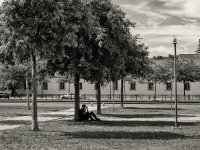Our Students’ Reality: We Can’t Ignore It
By making classrooms places where real-world work and thinking happen, we encourage inquiry, conversation, and conflict in hopes of creating something better for our students.
At their best, schools and classrooms affirm the power of community and what it means to be human.
I once taught a student who spent months struggling with depression and cutting. One day, I watched her stand up in front of the class and share a poem that she'd written about her struggles. When she finished, the class erupted with cheers and people calling out "You go!" and "That's right!" The student walked back to her seat with her head down, unable to conceal the smile and her pride.
Another year, I watched a student who was so uncomfortable in her body that when she was asked to be part of a group physical warm-up, all she could do was smirk and laugh uncontrollably. Weeks later, the same student performed a site-specific dance piece that her group had choreographed for an audience of hundreds in a city-wide arts festival.
Last year, I listened as a mixed group of students, some of whom had memories of traumatic experiences at the hands of police officers and others who had police officers in their families, shared responses to the death of Michael Brown. The room was filled with sadness, fear, and hurt as students disagreed, yelled, and cried but also heard each other.
Seeing Potential and Reality
Celebrating the potential of young people and the power of democratic education also means acknowledging and understanding the different ways that our society falls short.
The other day, a student dragged his feet as he slowly entered my classroom, having made multiple trips during the night between his home and the 24-hour pharmacy. He'd been trying to get the medicine for his father's cancer treatment but had continually run into bureaucratic obstacles symptomatic of a dysfunctional healthcare system.
Years ago, when I spoke to a student whose grades and engagement in class had dropped dramatically during December, I learned that her family's heat had been cut off. She was unsure when her family would have the money to pay the bill in order to get it turned back on. Another year, I learned that a student had been living without electricity for months. She became accustomed to doing her homework and putting on her makeup by flashlight.
I have seen students spend their teenage years bouncing from apartment to shelter, sometimes coming to school with no idea about where they would sleep and if there would be a meal at the end of the day.
Believing in education and believing in human potential means acknowledging inequalities that are ingrained in the fabric of our society. Being an educator means meeting people where they are and helping them understand themselves, their reality, our society, and the world. In our country, different teaching contexts differ drastically, and yet young people from all backgrounds deserve to be challenged and nurtured in order to develop visions of social change and possibility. This work is as important (and possibly more important) for those raised within insular backgrounds of privilege as it is for those who struggle at the margins of our society.
At the root of the work is the need to acknowledge injustice and feel empowered to act. Within our schools, young people should be encouraged to challenge and question broken aspects of society that are often accepted as normal or natural. We all need to be regularly reminded to maintain a vision of possibility and change. In the modern world, it is inexcusable that there are people forced to live without dignity.
Reflect and Act
Teaching is complex work, and the challenges make it all too easy for teachers to lose focus of a greater vision for students and for society. The questions below provide an opportunity to self-evaluate, recalibrate, and return to intentionality in our work with students -- actions that I have to undertake regularly in order to sustain my teaching practice.
- Are there different ways that students' realities and experiences are acknowledged in my class?
- Am I exposing students to information that helps them understand the realities of others, particularly those whose voices are marginalized in society?
- Am I providing opportunities for student voices to be the dominant voices of the learning process?
- Is the classroom a safe place to share opinions? Are people encouraged to disagree?
- Am I encouraging students to develop a vision of hope, change, and possibility?
In his book Sitting in the Fire: Large Group Transformation Using Conflict and Diversity, Arnold Mindell writes that "engaging in heated conflict instead of running away from it is one of the best ways to resolve the divisiveness that prevails on every level of society" (12). At a time when our society desperately needs vision and action, we can look to youth for inspiration. By making classrooms places where real-world work and thinking happen, we encourage inquiry, conversation, and conflict in the hope of creating something better.
In "Letter from a Birmingham Jail," Martin Luther King, Jr. articulated a timeless truth:
Regardless of the community or the school, all of our young people deserve to be nurtured and challenged. The pursuit of justice is merely an acknowledgment that all our futures are intertwined.
Do your students regard your classroom as a safe space? How do you acknowledge their realities and experiences as a part of your teaching practice?
